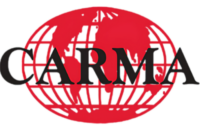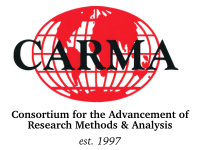
Consortium for the Advancement of Research Methods & Analysis
June 2025 Live Online Short Course
Data Visualization
Dr. Goran Kuljanin
Session II: June 9-12 | 10:00 AM EDT – 3:00 PM EDT
Course Description
This CARMA short course provides a comprehensive introduction to reproducible data visualization with R and RStudio. During this course, students will learn how to: (1) create analytical projects, (2) write analytical notebooks, (3) wrangle data for visualizations, (4) decide between different kinds of visualizations for specific analytical goals, (5) apply visualization principles to create insightful visualizations, (6) program data visualizations with ggplot2 and other R packages, (7) iterate on initial data visualizations, (8) visualize cross-sectional, time series, network, and geographic data, (9) develop static, animated, interactive, and reactive data visualizations, and (10) write user-defined functions to develop many data visualizations at once. Throughout the course, students engage in active learning by completing tasks associated with lectures to develop their data visualization knowledge and skills.
Course Materials:
I will provide all course materials, which includes primary content from me and secondary content consisting of free online resources on data visualization using R and RStudio.
Software:
For this course, we will use the powerful analytics software duet: R (the programming language) and RStudio (the integrated development environment). Before the course begins, students will need to download and install the following software:
1. Students may download R for free on their personal computer by going to: https://www.r-project.org. R requires roughly 5 MB of storage space on a computer.
2. Students may download RStudio for free on their personal computer by going to: https://posit.co/download/rstudio-desktop/. RStudio requires roughly 700 MB of storage space on a computer.
I will provide an instructional video on how to download and install the two software applications. Even if students previously installed R and RStudio on their computers, they should update their software to the latest version of R and RStudio.
Students will also install R packages, which vary in size, via RStudio during live class sessions. R packages vary in size, but we will install them during class sessions. Most notably, we will download and install the tidyverse meta-package, which will automatically download and install many common primary packages of interest to every day analytical work. We will rely on the comprehensive ggplot2 package as our primary data visualization software, but we will also utilize other R data visualization packages such as timetk, gganimate, tidygraph, sf, plotly, and shiny.
Computer Notes:
Powerful analytics software, like R and RStudio, require sufficiently powerful computers. A computer needs sufficient storage space and processing power to work effectively with R and RStudio. This implies certain computers (e.g., Chromebooks) may not work well with R and RStudio due to their limited processing power or storage space.
Students using computers with operating systems listed on the RStudio website can assume their computer has the required specifications. Yet, students should keep their operating systems up to date. Additionally, students may need to create storage space on their computers by moving big files (e.g., videos, music, photos, podcasts, etc.) to a cloud storage service (e.g., OneDrive, Dropbox, Box, etc.).
Students should treat their computers well when they use them. This generally means students should not have too many programs or browser windows/tabs open at any one moment. Such behavior limits the operational and processing power of computers.

Meet the Instructor
Professor Goran Kuljanin serves as an Assistant Professor in the Department of Management and Entrepreneurship in the Driehaus College of Business at DePaul University. He primarily teaches courses on business and people analytics. His courses cover topics such as data visualization, analytical notebooks, unsupervised and supervised learning, natural language processing, web scraping, time series forecasting, business process analytics, and organizational network analysis.
Professor Kuljanin’s research focuses on developing computational process models of human functioning and workplace operations to enable process-oriented, strategic decision-making on human resources management. He has published his research in the Journal of Applied Psychology, Leadership Quarterly, Organizational Research Methods, and Psychological Methods. His research awards include Best Article in Organizational Research Methods in 2013, the 2015 William A. Owens Scholarly Achievement Award from the Society of Industrial and Organizational Psychology, and a Monograph Distinction from the Journal of Applied Psychology. As a co-investigator, he has won grants from the U.S. Army Research Institute for the Behavioral and Social Sciences.
Professor Kuljanin’s consulting work focuses on analyzing data on any organization’s most important resource: its people. Specifically, his consulting work involves applying advanced analytics (e.g., machine learning, dynamical modeling, organizational network analysis, natural language processing, computational process modeling) on employee, team, organizational, and client data to develop effective work strategies to meet organizational objectives.




